
A big band or jazz orchestra is a type of musical ensemble of jazz music that usually consists of ten or more musicians with four sections: saxophones, trumpets, trombones, and a rhythm section. Big bands originated during the early 1910s and dominated jazz in the early 1940s when swing was most popular. The term "big band" is also used to describe a genre of music, although this was not the only style of music played by big bands.
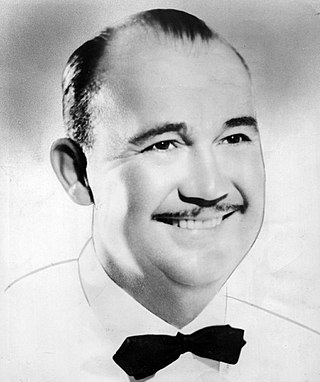
Paul Samuel Whiteman was an American bandleader, composer, orchestral director, and violinist.

Rhapsody in Blue is a 1924 musical composition written by George Gershwin for solo piano and jazz band, which combines elements of classical music with jazz-influenced effects. Commissioned by bandleader Paul Whiteman, the work premiered in a concert titled "An Experiment in Modern Music" on February 12, 1924, in Aeolian Hall, New York City. Whiteman's band performed the rhapsody with Gershwin playing the piano. Whiteman's arranger Ferde Grofé orchestrated the rhapsody several times including the 1924 original scoring, the 1926 pit orchestra scoring, and the 1942 symphonic scoring.

Ferdinand Rudolph von Grofé, known as Ferde Grofé was an American composer, arranger, pianist, and instrumentalist. He is best known for his 1931 five-movement symphonic poem, Grand Canyon Suite, and for orchestrating George Gershwin's Rhapsody in Blue for its 1924 premiere.
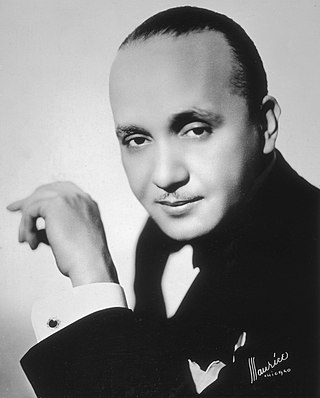
James Fletcher Hamilton Henderson was an American pianist, bandleader, arranger and composer, important in the development of big band jazz and swing music. He was one of the most prolific black musical arrangers and, along with Duke Ellington, is considered one of the most influential arrangers and bandleaders in jazz history. Henderson's influence was vast. He helped bridge the gap between the Dixieland and the swing eras. He was often known as "Smack" Henderson.
The Grand Canyon Suite is a suite for orchestra by Ferde Grofé, composed between 1929 and 1931. It was initially titled Five Pictures of the Grand Canyon.

Mississippi; Tone Journey is a 1926 orchestral suite in four movements by Ferde Grofé, depicting scenes along a journey down the Mississippi River from its headwaters of Minnesota to New Orleans.

"Smoke Gets in Your Eyes" is a show tune written by American composer Jerome Kern and lyricist Otto Harbach for the 1933 musical comedy Roberta. The song was sung in the Broadway show by Tamara Drasin. Its first recorded performance was by Gertrude Niesen, who recorded the song with orchestral direction from Ray Sinatra, Frank Sinatra's second cousin, on October 13, 1933. Niesen's recording of the song was released by Victor, with the B-side, "Jealousy", featuring Isham Jones and his Orchestra. The line — When your heart's on fire, smoke gets in your eyes — apparently comes from a Russian proverb.
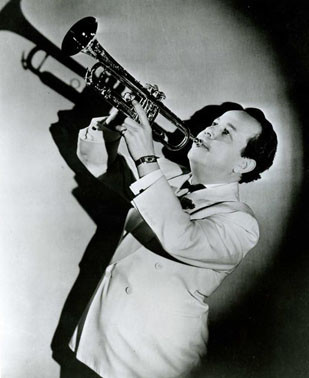
Henry Busse Sr. was a German-born jazz trumpeter. A 1948 review in Billboard magazine said that Busse had "a keen sense of musical commercialism".
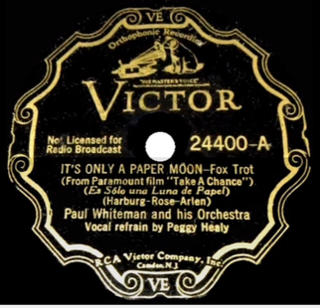
"It's Only a Paper Moon" is a popular song published in 1933 with music by Harold Arlen and lyrics by Yip Harburg and Billy Rose.

Roy Fredrick Bargy was an American composer and pianist.

"Somebody Loves Me" is a popular song, with music written by George Gershwin, and lyrics by Ballard MacDonald and Buddy DeSylva. The song was published in 1924 and featured in George White's Scandals of 1924.
Alfred J. Gallodoro, was an American jazz clarinetist and saxophonist, who performed from the 1920s up until his death. He is notable for having played lead alto sax with the Paul Whiteman Orchestra and bass clarinet for 12 years with the NBC Symphony Orchestra under Arturo Toscanini. Bandleader Jimmy Dorsey praised him as "the best sax player who ever lived."
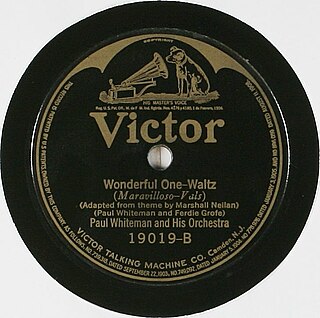
"Wonderful One" is a popular song recorded by the Paul Whiteman Orchestra on January 25, 1923 in New York and was released as Victor 19019-B. The record reached no. 3 on the Billboard chart. The song was also recorded as "My Wonderful One".
Murray McEachern was a Canadian jazz trombonist and alto saxophonist, perhaps best known for having played trombone for Benny Goodman from 1936 to 1937. McEachern is also remembered for playing both the trombone and alto saxophone for the Casa Loma Orchestra from 1937 to 1941.
Joseph Anthony "Fud" Livingston was an American jazz clarinetist, saxophonist, arranger, and composer.

"Hot Lips" or "He's Got Hot Lips When He Plays Jazz" is a popular song written by jazz trumpeter Henry Busse, Henry Lange, and Lou Davis. The song was a number one hit for Paul Whiteman and His Orchestra. Henry Busse was a founding member of the Paul Whiteman Orchestra, joining in 1920.

"Whispering" is a popular song published in 1920 by Sherman, Clay & Co. of San Francisco. The 1920 copyright attributes the lyrics to Malvin Schonberger and the music to John Schonberger.

The Smithsonian Collection of Classic Jazz is a six-LP box set released in 1973 by the Smithsonian Institution. Compiled by jazz critic, scholar, and historian Martin Williams, the album included tracks from over a dozen record labels spanning several decades and genres of American jazz, from ragtime and big band to post-bop and free jazz.
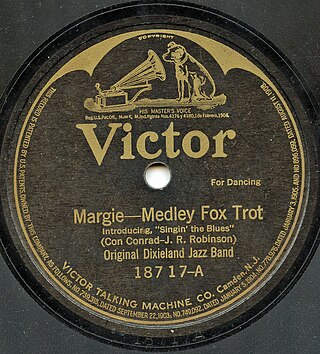
"Singin' the Blues" is a 1920 jazz composition by J. Russel Robinson, Con Conrad, Sam M. Lewis, and Joe Young. It was recorded by the Original Dixieland Jass Band in 1920 as an instrumental and released as a Victor 78 as part of a medley with "Margie". The song was released with lyrics by vocalist Aileen Stanley in 1920 on Victor. In 1927, Frank Trumbauer, Bix Beiderbecke, and Eddie Lang recorded and released the song as an Okeh 78. The Trumbauer recording is considered a jazz and pop standard, greatly contributing to Frank Trumbauer and Bix Beiderbecke's reputation and influence. It is not related to the 1956 pop song "Singing the Blues" first recorded and released by Marty Robbins in 1956.

















